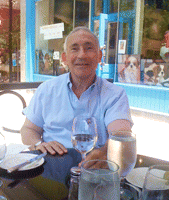Psychiatrist Mark Lawrence, M.D., of McLean, Va., was reportedly shot and killed by a patient who then killed herself. The murder-suicide occurred July 22 in Lawrence's home office. He was 71 years old.
In the wake of Lawrence's death, APA posted the following statement on its Web site: "The American Psychiatric Association is saddened and shocked at the murder of psychiatrist Mark Lawrence, M.D. of McLean, Virginia, by a patient who then killed herself. Our hearts are with the families affected by this tragedy."
APA's statement also includes links to a "President's Column" written by APA President John Oldham, M.D., in the July 15 Psychiatric News and a recent letter to the New York Times, also by Oldham, addressing the subject of violence and serious mental illness.
Other Washington, D.C., area psychiatrists who knew Lawrence described a man who was an innovative thinker and an empathic clinician who was passionate about psychotherapy.
APA Secretary Roger Peele, M.D., recalls that Lawrence trained at Massachusetts Mental Health Center and that Lawrence early on pursued a promising career in public psychiatry, first at the National Institute of Mental Health (NIMH) and later as a director of a community mental health center in the District of Columbia.
"He was a major star in public psychiatry and was headed for what might have been a prominent position if he wanted it at NIMH, but he chose to enter private practice," Peele recalled. "He became very active in areas that not many psychiatrists enter, doing group- and family-therapy work, imaging work, and avante-garde psychotherapies."
Lawrence was a founder of and frequent teacher at the Center for Healing and Imagery in McLean, Va. The center's Web site states, "The Center for Healing and Imagery (CHI) was founded in 1984 on two related premises: first, ‘talk therapy’ is often not enough to access and transform the most important and most hidden unconscious experiences; second, ‘right-brain’ oriented approaches can be extremely effective in breaking through therapeutic impasses and managing affective crises."
In the wake of Lawrence's death, the center posted this statement: "We deeply mourn the tragic loss of our dear friend and colleague Mark Lawrence. The Center for Healing and Imagery will sponsor a memorial tribute in the fall to reflect on the many ways that Mark enriched all our lives and to recognize his extraordinary contributions to our therapeutic community."
A close friend and long-time colleague, Melvin Stern, M.D., described Lawrence as "warm, engaging, a good listener, and exceedingly creative."
He added, "He was a really good psychodynamic psychiatrist. That's really how he saw himself. He prescribed medications when he needed to, but he liked doing psychotherapy, and he mixed a variety of techniques and did it very well."
Lawrence, Stern, and another Washington, D.C., area psychiatrist, Jerrold Post, M.D., were among a small group of psychiatrists who formed a peer-supervision group that began meeting in 1974 to discuss group- and family-psychotherapy cases in which the psychiatrists were involved.
Over the years the nature and composition of the group changed, evolving into a book and intellectual discussion group that included nonclinician professionals. Some 36 years later, the group was still meeting; its last meeting was a month prior to Lawrence's death.
"I was consistently impressed by his combination of a very powerful intellect with warmth and creativity and compassion," Post told Psychiatric News. "He was quite innovative in his use of guided imagery and was really exploring new frontiers in integrating cognitive and affective aspects of therapy."
Neither Post nor Stern was able to shed light on the circumstances of Lawrence's death. However, Stern told Psychiatric News that Lawrence had spoken to him the day before the shooting about the patient and expressed concern about her. However, Stern also said that his friend had not conveyed any sense that the patient was dangerous.

